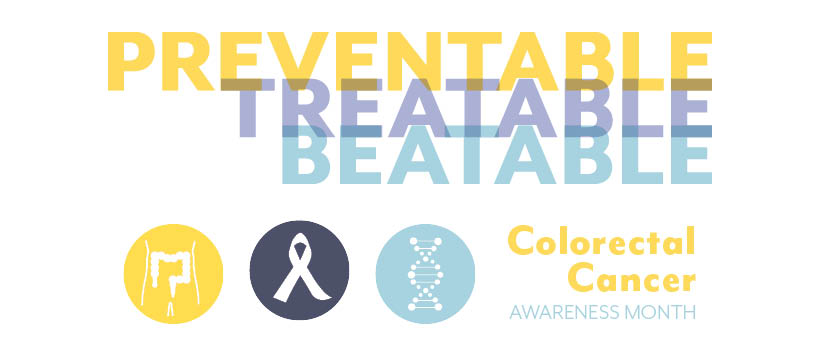March is Colorectal Cancer Awareness Month
Join us throughout the month to raise awareness of colorectal cancer.
Learn more about social media topics below:
Risk Factors for Colorectal Cancer
Certain factors increase a person’s risk for developing colorectal cancer. Some of these factors are uncontrollable, such as your age. Some factors are associated with lifestyle and can be modified to assist with reducing the risk of developing colorectal cancer.
Factors you can’t change:
- Age
- Personal and/or family history of colorectal cancer, colorectal polyps, and/or ovarian cancer
- Inflammatory bowel disease
- Having type II diabetes
- Genetics
- Race and ethnicity; Alaska Native, American Indian, African American, Latino, and Jewish people of Eastern European descent
Lifestyle related factors you may be able to change:
- Lack of physical activity
- Unhealthy diet
- Being overweight or obese
- Alcohol use
- Tobacco use
If you are at increased risk, talk to your provider about when it is best to start screening.
For more information or to schedule an appointment, contact your provider. Click here for SCF’s clinic specific contact information.
Symptoms of Colorectal Cancer
Precancerous polyps and early-stage colorectal cancer often have no signs or symptoms. However, over time, symptoms may occur. These symptoms can sometimes be associated with non-cancerous medical conditions. * If you experience any of these symptoms, it is important to listen to your body and speak with your medical provider to help address the underlying cause.
Colorectal Cancer Signs and Symptoms include:
- Rectal bleeding or blood in stool
- Diarrhea and/or constipation
- Narrowing of stool
- Persistent abdominal discomfort
- Nausea or vomiting
- Unexplained weight loss
- Chronic fatigue or weakness
Colorectal Cancer Screenings
Did you know that screening for colorectal cancer should begin at age 40? Screening should be earlier if your mother, father, sister, and/or brother has been diagnosed with colorectal cancer. Early screening would start 10 years before the age this family member was diagnosed.
Colorectal exams are preventative screenings used to evaluate the colon for pre-cancerous growths called polyps. The growths can be removed before they turn into cancer. Alaska Native men and women should begin colorectal screening at age 40 or earlier.
A Colonoscopy is:
- a test that allows a provider to view the entire colon with a small camera called a scope and remove polyps.
- recommended every 10 years.
- able to be used as a follow-up exam if needed after one of the other screening tests.
FIT (Fecal Immunochemical Test) screening is:
- A stool test that can be done at home and returned to your provider for further testing. The stool is evaluated for blood or DNA changes
- Recommended every year or every three years, depending on the test
Talk to your provider about when it is best for you to start your colorectal cancer screenings and which screening is best for you. Click here to find your clinic’s contact information.
Start Screening at Age 40
Colorectal exams are preventative screenings used to evaluate the colon for pre-cancerous growths called polyps. The growths can be removed before they turn into cancer. Alaska Native men and women should begin screening at age 40 or sooner if their father, mother, sister, and/or brother have been diagnosed with colorectal cancer.
Visit the Colorectal Cancer Screenings tab above to learn more about screening options or click here to find your clinic’s contact information.
How to Lower Your Risk for Colorectal Cancer
While preventative screenings are the most important step toward preventing colorectal cancer, it is not the only one. There are several key opportunities for decreasing your risk of developing colorectal cancer. Making positive lifestyle choices gives you more control of your overall health and enables you to take an active role in strengthening your personal wellness.
- Eat well – Aim for a diet high in vegetables, fruits, and other plant food, all of which are packed with dietary fiber and nutrients. Avoid processed meats and lower your red meat intake.
- Get exercise – Aim for 30 – 60 minutes of exercise per day
- Maintain a healthy weight
- Avoid consuming alcohol or tobacco
Talk to your provider about when it is best for you to start your colorectal cancer screenings and which screening is best for you. Click here for SCF’s clinic specific contact information.
Anchorage
Health Education
4201 Tudor Centre Drive
Anchorage, AK 99508
Phone
907-729-2689
Hours
8 a.m. – 4:30 p.m.
Monday – Friday
Matanuska-Susitna Borough
Benteh Nuutah Valley
Native Primary Care Center
Wellness Center
1001 S. Knik-Goose Bay Rd
Wasilla, AK 99654
Phone
907-631-7630
Fax
907-631-7653
Hours
7 a.m. – 6 p.m.
Monday – Friday

